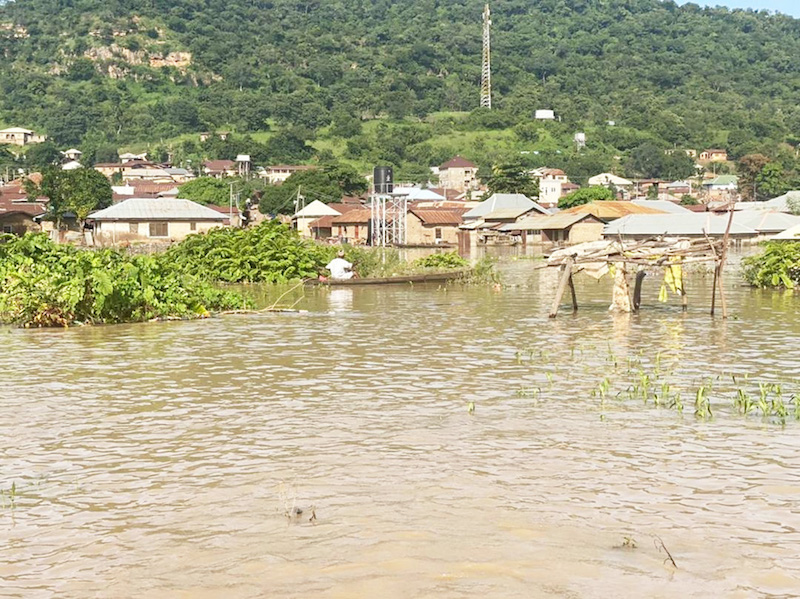By Atoyebi Nike
Catastrophic flooding across Nigeria has emerged as one of the most urgent threats to national stability this year, with the tragic Mokwa incident serving as a brutal reminder of the cost of environmental neglect and climate inaction. In the final days of May, floods in Mokwa, Niger State, swept through dozens of communities, killing more than 500 people and displacing thousands.
The deluge, which unfolded between May 28 and 29, obliterated over 4,000 homes, submerged vital croplands, and crippled roads and bridges. Local farmers describe total devastation crops drowned, livestock lost, and a future uncertain.
The National Emergency Management Agency (NEMA) labeled the Mokwa disaster a “national emergency,” as aid efforts lag behind the scale of the destruction. Survivors remain stranded in temporary shelters with little to no access to food, water, or medical services.
Millions Under Threat as Flood Risk Soars Nationwide
Beyond Mokwa, the Nigerian Meteorological Agency (NiMet) has projected that over 15 million people in 30 states face a heightened risk of flooding during the 2025 rainy season. Already, states in Nigeria’s agricultural heartlands Benue, Kogi, Jigawa, and Kebbi are reporting widespread crop destruction.
For many rural households, this year’s planting season has ended in despair.
“This is the third year in a row I’ve lost everything to flooding,” said Salihu Danlami, a rice farmer in Kogi State. “I don’t know how I’ll feed my family or pay my children’s school fees.”
The loss of farmland is worsening an already fragile food supply chain. The Nigerian Bureau of Statistics has recorded a sharp decline in agricultural output, while food prices in urban markets have surged, fueling inflation and household hardship.
Infrastructure Breakdown Deepens Economic Wounds
The floods have also battered Nigeria’s already struggling infrastructure. Key road networks linking farm settlements to commercial hubs have collapsed, cutting off supply routes and triggering market shortages.
In Niger and Nasarawa states, bridge failures have paralyzed transportation, forcing farmers to abandon harvest-ready fields. With less food making it to market and higher transportation costs, the price of staples like rice, maize, and beans has skyrocketed by over 35% in some regions.
“The compounded effects of damaged roads, lost crops, and displaced communities are driving a silent economic crisis,” noted Dr. Yetunde Afolayan, an agricultural policy analyst. “We are now seeing the real cost of failing to climate-proof our infrastructure and food systems.”
Accountability Questions and Ecological Fund Concerns
While emergency responders are doing their best, critics argue that long-standing failures by state and federal governments have turned seasonal floods into lethal disasters. A recent investigation by Vanguard highlighted that states have underutilized or mismanaged ecological intervention funds meant to address flood risks and erosion control despite receiving over ₦620 billion in the last decade.
“The system is broken, and year after year, ordinary Nigerians pay the price,” said environmental rights advocate Hauwa Sani. “There’s no excuse for this level of unpreparedness.”
A Shrinking Nation of Arable Land
The Food and Agriculture Organization (FAO) warns that Nigeria is rapidly losing usable farmland, with more than 350,000 hectares lost annually to erosion, flooding, and desertification. The impact in 2025 is expected to be even greater.
As the waters continue to rise, so does the urgency for coordinated national action. Experts are urging federal and state authorities to implement climate-resilient farming techniques, invest in early-warning systems, enforce land management regulations, and empower local communities to adapt to changing weather patterns.
What’s at Stake
The 2025 flood season may be far from over, but it has already exposed systemic weaknesses in Nigeria’s ability to protect lives, land, and livelihoods. Without swift and sustainable interventions, the country risks slipping further into food insecurity, economic instability, and humanitarian crises.


